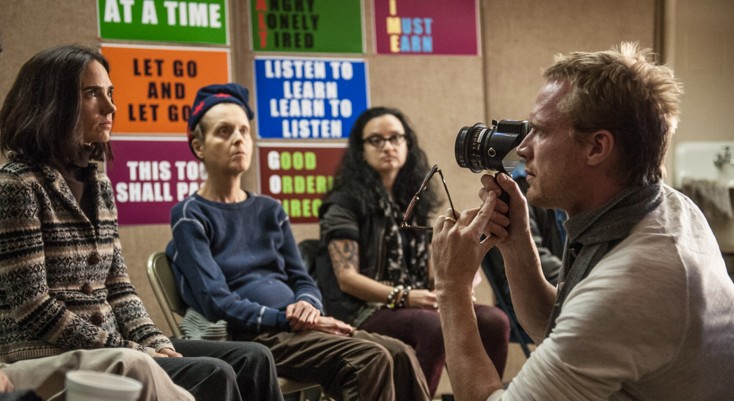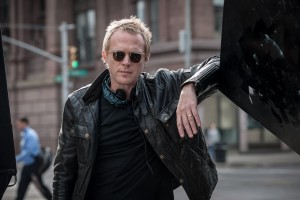By ANGELA DAWSON
Front Row Features
HOLLYWOOD—Stalwart British actor Paul Bettany has appeared in a more than two dozen films, mostly in a supporting capacity, over the past two decades. The tall, (he’s 6’3”) fair-haired actor has played opposite Russell Crowe twice (in “A Beautiful Mind” and “Master and Commander: The Far Side of the World”) and more recently has played the duel role of JARVIS/The Vision in the “Avengers” films opposite Robert Downey Jr.
But what Bettany has really wanted to do for a while is direct. And write. He finally gets his chance in the bleak, reality-check drama “Shelter,” about two individuals who find themselves homeless and running out of hope in New York.
During a recent stopover here to promote the drama, Bettany, 44, explained that he used to see a homeless couple regularly near his New York home, but one day they simply disappeared and it got him thinking about what became of them. He began looking into the subject and discovered that the number of homeless people in the city has skyrocketed in recent years, even though the economy supposedly has recovered.
“New York City over the last 15 years has lost 32 percent of its public housing and now we have 60,000 homeless people in shelters every night: 4,000 children, 19,000 women and half of the population in them are families,” he said. “Wages are staying the same as rents go up, so it’s a real problem.”
He wrote the part of the homeless woman for his Oscar winning wife, actress Jennifer Connelly, whom he met while they were filming “A Beautiful Mind,” directed by Ron Howard. He cast Anthony Mackie (also an “Avengers” character), as a Nigerian illegal immigrant who can’t get healthcare in one of the richest cities in the world because of his status. Connelly plays a junkie whom he befriends and tries to help clean up. The camera follows them through their efforts to simply stay alive and find shelter during an unforgiving winter and caught up in a broken system.
Bettany, who grew up in a show business family in London, revealed he recently lost his father and has been reflecting on his faith.
“He was a very religious man, a Catholic; I’m not,” he said. “But he used to say whenever we saw a homeless person, ‘There but for the grace of God go I,’ and I love that. I love the admission of how close we all are and how easily it could be us. And I wonder where that sentiment has gone.”
He noted that his debut film is more than a drama about homelessness. It’s about judgment.
Q: A couple that was living on the streets outside of your home inspired you?
Bettany: I set out to make a film that was about judgment, about how we judge each other both in the micro and the macro, and I didn’t know how I was going to tell that story or what shape the story would take. At the same time, as I was thinking about getting ready to write something, Hurricane Sandy happened, and a homeless couple who I had seen at my neighborhood and who I had passed every day on the way at a school run was part of my daily life, and in some way, I was part of their daily life. They seem to complain a lot less about their circumstances than I did.
Suddenly, they weren’t there anymore and I had the instinct to write about them. I didn’t know anything about them. I had an instinct to write about these two people that I had become blind to. I thought actually, that might be a really interesting way in which to discuss judgment because I think it is interesting the way that we respond to homelessness, either invisibility or downright aggression. “You must have done something to bring yourself here.” “I’m going to give them some money.” “Why will you give them money? They’re going to spend it on drugs.” If you haven’t said it, you’ve thought it, and frankly, who are we to judge?
But I did not want to or set out or attempt to write a film about homelessness being bad or drug addiction being bad or the people who live with either of those issues being victims or criminals. I really just wanted to know more about it and investigate it. That’s what I set out to do with a group called Coalition for the Homeless.
I set out to make two really unforgivable human beings and then make (the audience) forgive them because they’ve spent time with them, and we’re all worthy of forgiveness. We’re all innocent. It’s not just those 25,000 homeless children in New York. We’re all fundamentally deserving of a home. I feel that’s an urgent subject in the macro.
Q: Why do you think many of us who have a place to live look down on the homeless?
Bettany: Part of the response with homelessness is you have to have done something to bring this upon yourself because it would never happen to me because it’s terrifying. It absolutely could happen to you. If you think your mettle is somehow tougher than somebody else, why are there so many homeless veterans? Come on.
Q: When you wrote this, did you expect that you were going to direct it as well? Did you expect it was going to be a film or was it starting out as a writing exercise? What were your thoughts on that?
Bettany: I wrote it to direct. I didn’t think of myself as a writer and I don’t think of myself as a writer. I think of myself as a storyteller and I wanted to direct a movie and there’s this interstitial issue, which is you have to have the thing that you’re going to direct, so I started writing to direct. I saw (the story) very visually. I told financiers that I was going to be in it, but I was never going to be in it.
Q: Was Jennifer onboard from the get-go? Also, had she been reading it as you wrote it or did she wait until you finished?
Bettany: She says she was reading it, but she wasn’t. She read another project of mine in segments. This time, I felt that all contexts, these segments are not helpful to read. So my memory of it is that I wrote the whole thing and then presented it to her, but her memory is something different for that.
Q: What was her reaction? I’m sure you trust her judgment.
Bettany: She’s incredibly brutally honest in those situations surrounding everything. She’s very frank. She read it and she put it down and said, “I’ll do it,” so that was that.
Q: We’ve seen her play a similar sort of lost character in “Requiem for a Dream,” but it’s been a long time, and this one is different. For one thing, she’s older. She’s playing a mother. She’s got responsibilities so you judge her. And then you see her relationship with her father and how overprotective and demanding he is on her and why she chooses the path she does.
Bettany: Well, part of the inspiration for this came from a woman that I knew who was—I have to be very careful here—her husband died in the Twin Towers and slowly, she declined into alcoholism and prescription drug addiction, which she thankfully got herself out of, but was very close to slipping by the wayside. Who would cast judgment on that person? “Judge not lest ye be judged” and all of that. I’m not religious, but I was raised a Catholic so I’m just not that kind of human being.
While I was writing this I thought, “What’s the worst thing that you can be in our culture as a woman? A mother who abandoned her children. What’s the worst thing that you could be as a man? An ex-terrorist.” And then I put (the audience) in a position where you begin to understand the forces that are at work, that create the situations that these people find themselves in. It’s just an attempt for a slightly kinder response to the people that we see.
Q: How immersed did Jennifer get into this character? Did she spend some time with the homeless or visit shelters?
Bettany: She was a card-carrying member of the Needle Exchange Program in New York City where they thought she was a user. She was working with Lower East Side Harm Reduction Center on outreach programs and meeting people and talking to people. She’s just the most fastidious actor that I’ve ever met. She came ready to work.
Q: She really looks gaunt in this film. Did she lose weight for the role?
Bettany: There were times when it was really frightening for me worrying about her. I remember we were in an alleyway in New York City and she was supposed to be shooting up. The idea was that you were on her and you see her and she’s looking at something you can’t. It’s a beautiful image of Anthony, and then you cut back and the camera stands at her arm and you realize actually she’s shooting up.
The syringe that we had, which was retractable, didn’t look like the syringe she’d been using and the props guys didn’t have the right one. She said, “We can’t do it.” I said, “Don’t worry about it. I’ll take the camera back to the back of the alley. Nobody is going to know. I’ll shoot it.” She actually took her syringe and put it into her own vein and I went, “Whoa! Okay. Let’s roll the camera and shoot on this then,” so her commitment is second to none.
Q: Did you cast Anthony Mackie because you knew him from “Avengers?”
Bettany: No. Anthony and I didn’t know each other. We first worked together as a director and actor, and then we did “Avengers” after that. He read the script. I sent him the script because I think he’s a ******* fabulous actor and he said “yes.” We met and we had dinner together and we talked about it, and he was incredibly moved by the subject. Then I knew I had a good picture.
Q: Do you want to direct again?
Bettany: Oh, yeah, so much so. I loved it. What I realize in my mid-40s is that I just love telling stories. I was a guitar player and a singer when I was a kid. I love telling stories at dinner tables. I love acting and I love directing. I just really love telling stories so to be able to do it in different ways has been a real privilege.
Q: You’re among a growing number of actors who have turned to directing.
Bettany: Yeah. One forgets that Ron Howard (who directed “A Beautiful Mind”) was an actor-turned-director. I’d love to put him in one of my movies. I think he’s brilliant.






